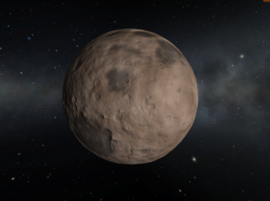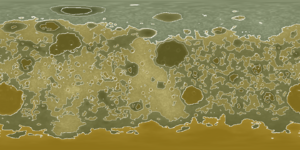Moho
| Moho | ||
| Moho as seen from orbit. | ||
| Planet of Kerbol | ||
| Orbital Characteristics | ||
| Semi-major axis | 5 263 138 304 m [Note 1] | |
| Apoapsis | 6 315 765 981 m [Note 1] | |
| Periapsis | 4 210 510 628 m [Note 1] | |
| Orbital eccentricity | 0.2 | |
| Orbital inclination | 7 ° | |
| Argument of periapsis | 15 ° | |
| Longitude of the ascending node | 70 ° | |
| Mean anomaly | 3.14 rad (at 0s UT) | |
| Sidereal orbital period | 2 215 754 s | |
| 102 d 3 h 29 m 14.2 s | ||
| Synodic orbital period | 2 918 346.4 s | |
| Orbital velocity | 12 186 - 18 279 m/s | |
| Physical Characteristics | ||
| Equatorial radius | 250 000 m | |
| Equatorial circumference | 1 570 796 m | |
| Surface area | 7.8539816×1011 m2 | |
| Mass | 2.5263314×1021 kg | |
| Standard gravitational parameter | 1.6860938×1011 m3/s2 | |
| Density | 38 599.500 kg/m3 | |
| Surface gravity | 2.70 m/s2 (0.275 g) | |
| Escape velocity | 1 161.41 m/s | |
| Sidereal rotation period | 1 210 000.0 s | |
| 56 d 0 h 6 m 40 s | ||
| Solar day | 2 665 723.4 s | |
| 123 d 2 h 28 m 43.4 s | ||
| Sidereal rotational velocity | 1.2982 m/s | |
| Synchronous orbit | Outside sphere of influence | |
| Sphere of influence | 9 646 663.0 m [Note 1] | |
| Atmospheric Characteristics | ||
| Atmosphere present | No | |
| Scientific multiplier | ||
| Surface | 10 | |
| Splashed | N/A | |
| Near space | 8 | |
| Outer space | 7 | |
| Recovery | 7 | |
|
| ||
Moho is the innermost planet of the Kerbol star system and the Mercury analogue for Kerbal Space Program. It resembles Dres and Eeloo, as it lacks an atmosphere and natural satellites. As of 0.18, it is no longer tidally locked to Kerbol.
Moho's inclined and eccentric orbit, lack of atmosphere (for aerobraking) and moons (for gravity assists) impede encountering and orbital capture.
Contents
In-game Description
| “ | Moho figures in Kerbal mythology as a fiery place with oceans of flowing lava. In reality, however, it's much less interesting. Scientists speculate about possible ways to make it awesome like in the stories. Some of those ideas have led to new breakthroughs in aerospace technology. — Kerbal Astronomical Society |
” |
Naming
Moho is also the name for the outermost layer of molten rock that makes up the mantle (that layer was the target of Project Mohole). It may have been named by Kerbal astronomers who, according to its in-game description, believed it to be flowing with rivers and oceans of lava.
Topography
Moho's surface ranges from light brown highlands to dark brown maria or basins, probably the product of volcanism. Its highest point is in its northern hemisphere at an altitude of 6817 m. Moho's heavy cratering, though less than that of the moons of Kerbin and Jool, suggests erosion. Tidal friction with Kerbol most likely causes airless Moho's erosion by inducing volcanic periods that fill craters(citation needed). The volcanism (i.e., superheated atmosphere) of Moho being removed in 0.18 could be argued to prove that Moho's volcanism is periodic, assuming that volcanic events occur on a cyclical geological timescale and that the change in 0.18 represented the end of a cycle.
Moho has a very deep well at its geographic north pole. Contrary to popular belief, there is no southern Mohole, even though it looks like there is one from the orbital map view. Current analysis and probe exploration have revealed the crater to be more than five kilometers deep; however, the probe crashed into the ever narrowing canyon walls before reaching the very bottom. A set of three probes was then sent to properly determine the depth to within 100 meters. The final analysis found the depth of the well to be around 4.6 km deep after the final probe reached the very bottom intact.[1] These wells may be dormant volcanic tubes. Further analysis of the canyon walls is needed for a final answer. This hole, often called the Mohole, may be a reference to Project Mohole or the deep well named the "Mohole" in the game Red Faction: Guerrilla.
Biomes
Moho has 12 biomes. It is one of two bodies (the other being Ike) that have their own North and South Pole biome. On the North Pole there is a big sinkhole called the Northern Sinkhole.
Biome list
- North Pole
- Northern Sinkhole Ridge
- Northern Sinkhole
- Highlands
- Midlands
- Minor Craters
- Central Lowlands
- Western Lowlands
- South Western Lowlands
- South Eastern Lowlands
- Canyon
- South Pole
Orbital Statistics
Mohosynchronous and semi-synchronous orbits are impossible — they would require altitudes of 18 182.08 km and 11 361.48 km respectively, both of which are beyond Moho's sphere of influence.
Reference Frames
| Time warp | Minimum Altitude |
|---|---|
| 1× | Any |
| 5× | 10 000 m |
| 10× | 10 000 m |
| 50× | 30 000 m |
| 100× | 50 000 m |
| 1 000× | 100 000 m |
| 10 000× | 200 000 m |
| 100 000× | 300 000 m |
Solar System Counterpart
It appears that Moho is the Kerbol System analog of the planet Mercury. Both share a similar cratered landscape, like most bodies with little to no atmosphere. Both planets are also the closest ones to their respective stars and are lacking of natural satellites. On the other hand Moho has a brown texture, but Mercury is grey to dark grey. In addition, Mercury has at least a very tenuous atmosphere of about 10⁻¹³ kPa while Moho has no atmosphere, although a pressure of only 10⁻¹³ kPa (≃ 10⁻¹⁵ atm) would be unmeasurable by the PresMat Barometer and consequently register in KSP as a vacuum.
Gallery
Bill Kerman having the time of his life wedged in the Northern Mohole.
Hanny Kerman wedged in the Northern Mohole sideways. Lots of orientation jittering was observed.
Changes
- Added biomes
- New, procedurally generated, textures added, with higher detail craters.
- Entirely changed more cratered surface.
- Color changed from red to brown.
- No more superheated atmosphere.
- No longer tidally locked.
- Mass reduced.
- Initial Release
Notes
- ↑ “Moho's Secrets Revealed” in the forums measuring the depth of the pit.








